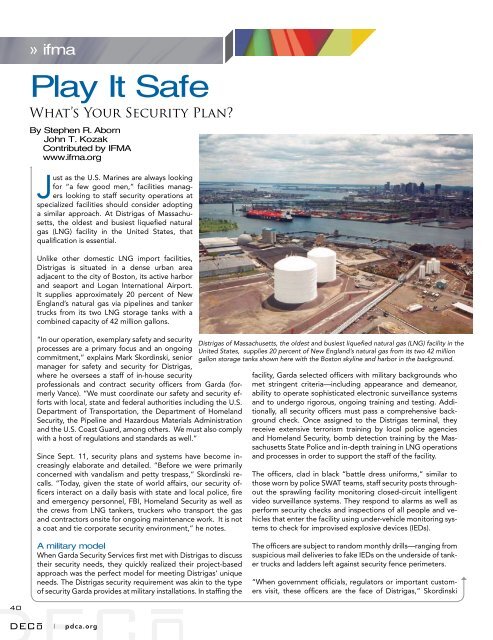n o v/d e c • 2 0 0 8 - Subscribe
n o v/d e c • 2 0 0 8 - Subscribe
n o v/d e c • 2 0 0 8 - Subscribe
You also want an ePaper? Increase the reach of your titles
YUMPU automatically turns print PDFs into web optimized ePapers that Google loves.
40<br />
» ifma<br />
Play It Safe<br />
What’s Your Security Plan?<br />
By Stephen R. Aborn<br />
John T. Kozak<br />
Contributed by IFMA<br />
www.ifma.org<br />
Just as the U.S. Marines are always looking<br />
for “a few good men,” facilities managers<br />
looking to staff security operations at<br />
specialized facilities should consider adopting<br />
a similar approach. At Distrigas of Massachusetts,<br />
the oldest and busiest liquefied natural<br />
gas (LNG) facility in the United States, that<br />
qualification is essential.<br />
Unlike other domestic LNG import facilities,<br />
Distrigas is situated in a dense urban area<br />
adjacent to the city of Boston, its active harbor<br />
and seaport and Logan International Airport.<br />
It supplies approximately 20 percent of New<br />
England’s natural gas via pipelines and tanker<br />
trucks from its two LNG storage tanks with a<br />
combined capacity of 42 million gallons.<br />
“In our operation, exemplary safety and security<br />
processes are a primary focus and an ongoing<br />
commitment,” explains Mark Skordinski, senior<br />
manager for safety and security for Distrigas,<br />
where he oversees a staff of in-house security<br />
professionals and contract security officers from Garda (formerly<br />
Vance). “We must coordinate our safety and security efforts<br />
with local, state and federal authorities including the U.S.<br />
Department of Transportation, the Department of Homeland<br />
Security, the Pipeline and Hazardous Materials Administration<br />
and the U.S. Coast Guard, among others. We must also comply<br />
with a host of regulations and standards as well.”<br />
Since Sept. 11, security plans and systems have become increasingly<br />
elaborate and detailed. “Before we were primarily<br />
concerned with vandalism and petty trespass,” Skordinski recalls.<br />
“Today, given the state of world affairs, our security officers<br />
interact on a daily basis with state and local police, fire<br />
and emergency personnel, FBI, Homeland Security as well as<br />
the crews from LNG tankers, truckers who transport the gas<br />
and contractors onsite for ongoing maintenance work. It is not<br />
a coat and tie corporate security environment,” he notes.<br />
A military model<br />
When Garda Security Services first met with Distrigas to discuss<br />
their security needs, they quickly realized their project-based<br />
approach was the perfect model for meeting Distrigas’ unique<br />
needs. The Distrigas security requirement was akin to the type<br />
of security Garda provides at military installations. In staffing the<br />
| pdca.org<br />
Distrigas of Massachusetts, the oldest and busiest liquefied natural gas (LNG) facility in the<br />
United States, supplies 20 percent of New England’s natural gas from its two 42 million<br />
gallon storage tanks shown here with the Boston skyline and harbor in the background.<br />
facility, Garda selected officers with military backgrounds who<br />
met stringent criteria—including appearance and demeanor,<br />
ability to operate sophisticated electronic surveillance systems<br />
and to undergo rigorous, ongoing training and testing. Additionally,<br />
all security officers must pass a comprehensive background<br />
check. Once assigned to the Distrigas terminal, they<br />
receive extensive terrorism training by local police agencies<br />
and Homeland Security, bomb detection training by the Massachusetts<br />
State Police and in-depth training in LNG operations<br />
and processes in order to support the staff of the facility.<br />
The officers, clad in black “battle dress uniforms,” similar to<br />
those worn by police SWAT teams, staff security posts throughout<br />
the sprawling facility monitoring closed-circuit intelligent<br />
video surveillance systems. They respond to alarms as well as<br />
perform security checks and inspections of all people and vehicles<br />
that enter the facility using under-vehicle monitoring systems<br />
to check for improvised explosive devices (IEDs).<br />
The officers are subject to random monthly drills—ranging from<br />
suspicious mail deliveries to fake IEDs on the underside of tanker<br />
trucks and ladders left against security fence perimeters.<br />
“When government officials, regulators or important customers<br />
visit, these officers are the face of Distrigas,” Skordinski








